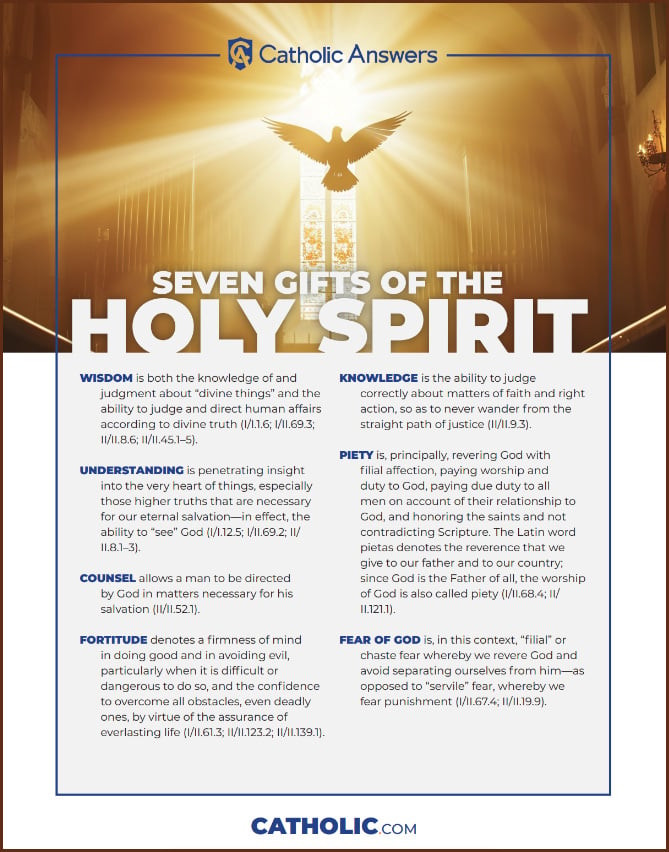In Catholic tradition, the Seven Gifts Of The Holy Spirit—wisdom, understanding, counsel, fortitude, knowledge, piety, and fear of God—are considered fundamental endowments for Christian life. These gifts, comprehensively interpreted by St. Thomas Aquinas in the 13th century within his Summa Theologiae, are not merely abstract concepts but practical tools for navigating life and growing in faith. They are designed to guide believers toward holiness and deeper communion with God.
Aquinas’s framework provides a robust understanding of each gift:
- Wisdom: This gift is more than just worldly knowledge. It encompasses both a profound understanding of “divine things” and the discernment to direct human actions in accordance with divine truth. Wisdom allows individuals to judge and order their lives based on eternal perspectives, not just temporal concerns.
- Understanding: Understanding offers a penetrating insight into the essence of reality, particularly those higher truths crucial for salvation. It’s the ability to grasp spiritual concepts and, in essence, “see” God’s presence and purpose in the world and in one’s own life.
- Counsel: This gift is about divine guidance in decisions related to salvation. Counsel enables individuals to be directed by God’s wisdom, particularly in morally complex situations, ensuring choices align with God’s will.
- Fortitude: Often referred to as courage, fortitude is the mental and spiritual strength to do good and resist evil, especially when facing difficulty or danger. It instills the confidence to overcome obstacles, sustained by the hope of eternal life.
- Knowledge: In this context, knowledge is not merely intellectual accumulation but the spiritual capacity to judge rightly concerning faith and action. It ensures one stays on the path of righteousness and truth, guided by divine revelation.
- Piety: Piety is fundamentally about reverence for God with filial love. It involves worship, duty to God, and also extends to treating all people with respect because of their relationship to God. It includes honoring saints and adhering to Scripture. Pietas in Latin signifies the respect due to a father and country, and since God is the ultimate Father, devotion to Him is also piety.
- Fear of God: This gift isn’t about being terrified of God, but rather “filial” or chaste fear. It’s a profound reverence for God that motivates us to avoid separation from Him. This contrasts with “servile” fear, which is merely fear of punishment. Fear of God, in its true sense, inspires awe and respect for God’s majesty and holiness.
These seven gifts represent heroic virtues, fully embodied by Jesus Christ and generously shared with members of His Church. Infused at baptism as a permanent spiritual endowment, they are nurtured through the practice of virtues and strengthened in the sacrament of Confirmation. They are also known as sanctifying gifts, designed to make individuals receptive to the Holy Spirit’s promptings, fostering spiritual growth and preparing them for eternal life.
Aquinas describes these gifts as “habits,” “instincts,” or “dispositions” provided by God. They are supernatural aids that empower individuals in their journey toward spiritual perfection. These gifts enable people to transcend human limitations and partake in divine life, as promised by Christ (John 14:23). Aquinas stressed their necessity for salvation, which he believed is unattainable by human effort alone. They serve to “perfect” the cardinal virtues (prudence, justice, fortitude, and temperance) and the theological virtues (faith, hope, and charity). Charity, or love, is crucial as it activates the potential of the seven gifts, which might otherwise remain dormant after baptism without active engagement.
 Image thumbnail of the printable PDF Seven Gifts of the Holy Spirit
Image thumbnail of the printable PDF Seven Gifts of the Holy Spirit
These gifts don’t operate in isolation. Drawing from the principle that “grace builds upon nature,” they work synergistically with the seven virtues, the twelve fruits of the Spirit, and the eight beatitudes. The practice of virtues cultivates an environment where the gifts can flourish, and conversely, the exercise of these gifts perfects the virtues. The proper use of the gifts leads to the manifestation of the fruits of the Spirit in a Christian’s life: love, joy, peace, patience, kindness, goodness, faithfulness, gentleness, modesty, self-control, and chastity (Galatians 5:22–23). This interplay of virtues, gifts, and fruits aims towards achieving the beatitudes, the eightfold path to happiness described by Christ in the Sermon on the Mount (Matthew 5:3–10).
Despite their historical significance and theological depth, the seven gifts of the Holy Spirit have unfortunately suffered from neglect within contemporary Catholic understanding and catechesis. Many Catholics, especially those who grew up in the mid-20th century, might recall memorizing the names of these gifts, but often without a deeper comprehension of their meaning or practical relevance. Confirmation, ideally the sacrament where these gifts are believed to be sealed, often became a rite of passage with little emphasis on the transformative power of these spiritual endowments.
The Challenge of Modern Catechesis
Post-Vatican II catechesis, while aiming for renewal and relevance, has ironically not improved the situation regarding the seven gifts. While pre-Vatican II approaches might have been overly focused on rote memorization, they at least acknowledged the gifts. Modern approaches often fail to instill a vibrant sense of what these gifts are and how they function in a believer’s life.
Rev. Charles E. Bouchard, O.P., in his article “Recovering the Gifts of the Holy Spirit in Moral Theology,” highlighted several weaknesses in traditional Catholic education regarding these gifts:
- Disconnect from Virtues: A significant oversight is the neglect of the intrinsic link between the seven gifts and both the cardinal and theological virtues. St. Thomas Aquinas himself emphasized this connection, seeing the gifts as perfecting and building upon these virtues.
- Marginalization to Mysticism: The gifts have often been relegated to the realm of mystical or ascetical spirituality, rather than being seen as integral to practical moral theology. Aquinas actually placed them firmly within the sphere of moral life and decision-making.
- Spiritual Elitism: Historically, a fuller understanding of the gifts was sometimes reserved for clergy and religious, under the presumption that lay individuals lacked the necessary learning or spiritual capacity to grasp them. This created an unnecessary barrier to accessing these gifts for ordinary believers.
- Limited Scriptural Grounding: Insufficient emphasis has been placed on the scriptural foundation of the gifts, particularly Isaiah 11:1-3, the primary biblical passage where they are identified and prophetically applied to the Messiah.
While the 1992 Catechism of the Catholic Church made some attempts to address these issues, acknowledging the importance of virtues and the gifts’ role in “the moral life,” it provided limited detail on the individual gifts themselves. This brevity perhaps contributed to continued confusion and varied interpretations in subsequent catechetical materials. Many definitions offered tend to be either vague reiterations of Thomistic concepts or subjective interpretations lacking solid theological grounding.
Reclaiming the Seven Gifts: A Biblical Perspective
To move beyond both rigid Thomistic interpretations and overly subjective contemporary approaches, a return to the biblical roots of the seven gifts is essential. Isaiah 11:1–3 remains the foundational text for understanding these spiritual endowments:
There shall come forth a shoot from the stump of Jesse, and a branch shall grow out of his roots. And the Spirit of the Lord shall rest upon him, the spirit of wisdom and understanding, the spirit of counsel and might, the spirit of knowledge and the fear of the Lord. And his delight shall be in the fear of the Lord.
This passage is universally recognized as the origin of the doctrine of the seven gifts. However, the deep connection of these seven qualities to the ancient Israelite “Wisdom” tradition is often overlooked. This tradition, evident in books like Job, Proverbs, Ecclesiastes, and Psalms, focuses on the practical ethics of daily living—managing relationships, making just decisions, and living virtuously in the everyday world. Isaiah 11 is rooted in this practical, wisdom-oriented context.
The verses following the description of the gifts in Isaiah 11 emphasize the active and transformative nature of the Messiah’s reign, characterized by justice and peace established through decisive action:
He shall not judge by what his eyes see, or decide by what his ears hear; but with righteousness he shall judge the poor, and decide with equity for the meek of the earth; and he shall smite the earth with the rod of his mouth, and with the breath of his lips he shall slay the wicked. . . . They shall not hurt or destroy in all my holy mountain; for the earth shall be full of the knowledge of the Lord as the waters cover the sea. (Isaiah 11:3–4, 9)
Establishing God’s kingdom, as depicted here, is not a passive endeavor. It requires active engagement, planning, courage, and perseverance—a willingness to be involved in the practical realities of life. This earthly, action-oriented perspective is crucial for understanding the role of the seven gifts in the lives of Christians who are striving to live out their faith in the world.
Sometimes, Christian spirituality can lean too heavily towards detachment from the world, as if focusing solely on the afterlife guarantees holiness. Vatican II corrected this imbalance by re-emphasizing the biblical concept of the Kingdom of God as a present reality that transforms the world, not just transcends it (Dei Verbum 17; Lumen Gentium 5; Gaudium et Spes 39).
The seven gifts are vital resources for building this Kingdom. They are, in a sense, the spiritual tools needed for engaging in what is often called “spiritual warfare”—the daily struggle against sin and for righteousness in personal life and in the world. Just as a soldier needs proper equipment for battle, Christians need these spiritual gifts to effectively navigate life’s challenges and contribute to God’s kingdom.
 Image thumbnail of the printable PDF Seven Gifts of the Holy Spirit
Image thumbnail of the printable PDF Seven Gifts of the Holy Spirit
These gifts are not just for spiritual elites; they are a patrimony for every baptized Christian, available from childhood. They are given in the sacraments to be developed through experience and virtuous living. They don’t appear spontaneously but emerge gradually as a result of actively living a virtuous life. Once developed, they are not withdrawn but remain necessary throughout life’s ongoing spiritual journey.
The purpose of the seven gifts is to empower Christians to transform the world for Christ. Isaiah 11 illustrates their intended use: to fulfill one’s calling in advancing God’s kingdom in their specific time and place. Understanding one’s limitations and dependence on God (fear of the Lord), embracing one’s place in God’s family (piety), and learning to follow God’s guidance (knowledge) are foundational. These lead to the strength to confront evil (fortitude) and the wisdom to navigate life’s complexities (counsel). Engaging in this “spiritual warfare” deepens one’s understanding of God’s plan (understanding) and refines one’s ability to live out their vocation effectively (wisdom).
Soldiers for Christ Today
Reflecting on the neglect of the seven gifts is particularly relevant for adult Catholics who may have received incomplete catechesis. The ongoing discussions within the Church about Confirmation age highlight the broader issue of effective faith formation. Simply imparting knowledge or promoting superficial acts of kindness without a strong evangelical foundation is insufficient for engaging young people in their faith. Modern trends in catechesis should not overshadow the fundamental need for a robust understanding of spiritual gifts and their practical application.
Cultivating the spiritual arsenal of the seven gifts needs to begin early in life, guided by the virtues. Perhaps it’s time to reconsider the traditional image of baptized Christians as “soldiers of Christ.” While the term might seem outdated in a post-Vatican II context that sometimes downplays “militancy,” it captures the active engagement and spiritual strength that these gifts are meant to foster. The challenges of the modern world underscore the need for a renewed appreciation of these spiritual weapons for the daily battles of Christian life. The seven gifts of the Holy Spirit provide the spiritual weaponry needed for the spiritual warfare of everyday life.
Enjoyed this content? Support our ad-free platform.

